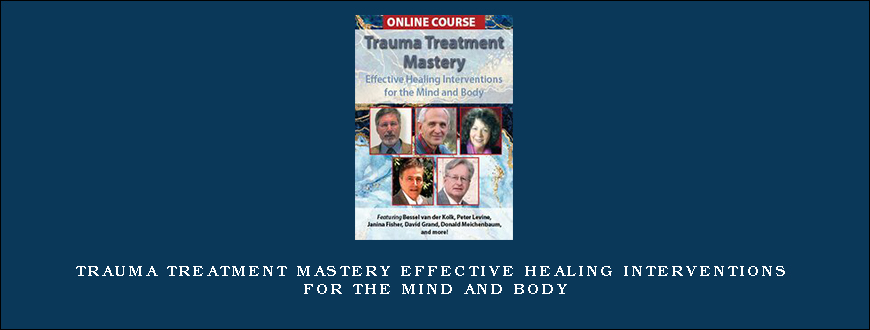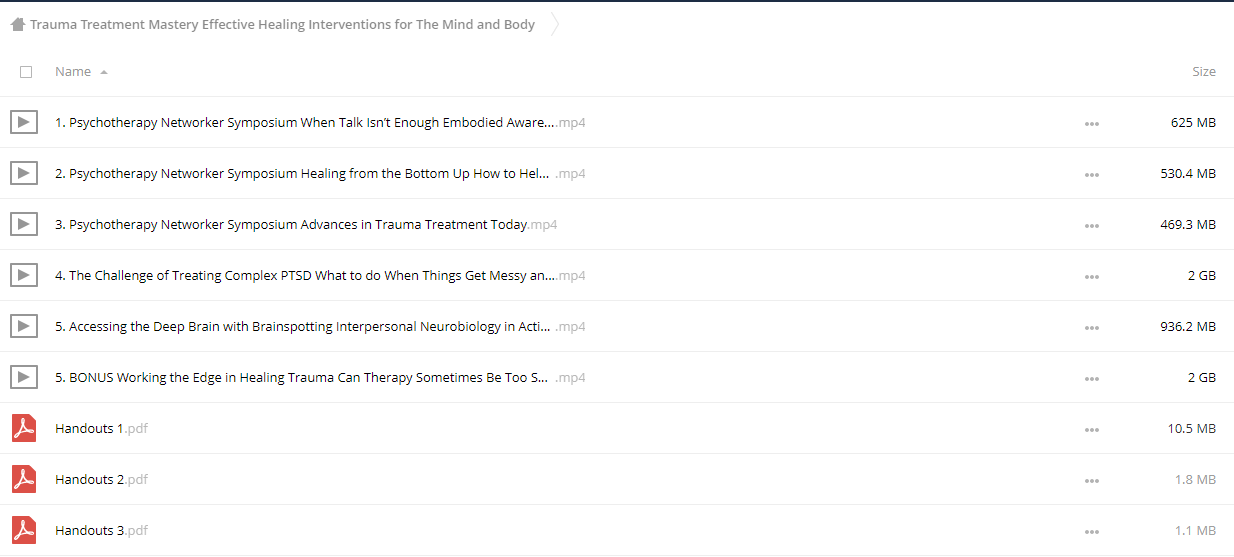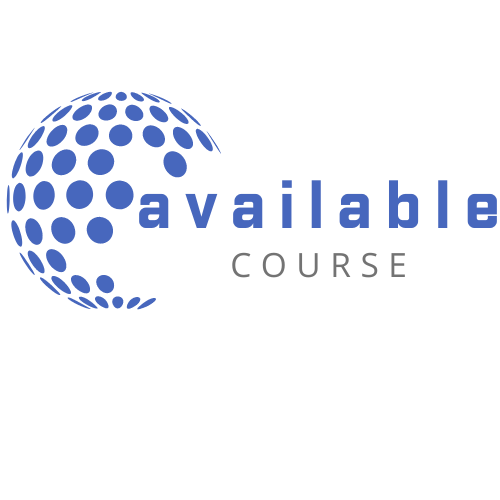
Trauma Treatment Mastery Effective Healing Interventions for The Mind and Body


Download Trauma Treatment Mastery Effective Healing Interventions for The Mind and Body on Avaicourse.com
This course is available immediately. Please contact us at [email protected] with the best service for more detailed advice.
Description:
Trauma is a complex issue—the problems are deep and challenging to explore. In order to provide help, we need effective, scientifically-based tools that work at healing both the mind and body.
The problem is that uncovering effective treatment methods often takes years of clinical research and practice.
That’s why we’ve developed this transformative new online course featuring some of the field’s leading trauma innovators—Bessel van der Kolk, Peter Levine, Janina Fisher, Don Meichenbaum, David Grand, Mary Jo Barrett, Linda Stone Fish, John Brier and Diane Poole Heller—to share their proven methods of creating safety and therapeutic attunement that leads to lasting healing.
Register today and get a front-row seat to learn from their decades of scientific research and clinical insight on some of the most powerful trauma treatment methods available (EMDR, Somatic Experiencing®, Sensorimotor Psychotherapy, Brainspotting, CBT, and the Collaborative Stage Model).
Discover proven trauma treatment tools and strategies that you can immediately apply into your own work!
Learn Proven Methods from Leading Trauma Innovators
When Talk Isn’t Enough: Embodied Awareness in the Consulting Room
Bessel van der Kolk, M.D.
After being traumatized, the body keeps pumping out stress hormones that make people feel frazzled, agitated, or shut down. Talk therapy alone doesn’t reset the limbic system, the part of the brain that creates a sense of fear and helplessness. In this session, you’ll learn how traumatic imprints can be addressed using techniques drawn from yoga, theater, and somatic therapy.
Bessel van der Kolk, MD, has been the medical director of The Trauma Center in Boston for 30 years. He’s a professor of psychiatry at Boston University Medical School and the director of the National Center for Child Traumatic Stress Complex Trauma Network. He is the author of the best-selling book, The Body Keeps the Score: Mind, Brain, and Body in the Healing of Trauma.
Healing from the Bottom Up: How to Help Clients Access Resource States
Peter Levine, Ph.D.
One of the keys to helping clients move beyond trauma is helping them learn how to access safety and positive resource states instead of repeatedly experiencing threats that no longer exist. In this session, we’ll focus on specific tools for reading clients’ psychological and physical cues and using their natural instincts to heal and rebalance their physiology.
Peter Levine, PhD, is the developer of Somatic Experiencing. He’s written a variety of books, including Waking the Tiger and In an Unspoken Voice. He’s the recipient of the USABP lifetime achievement award for his contribution to trauma.
Accessing the Deep Brain with Brainspotting
David Grand, Ph.D.
Symptoms of unprocessed trauma—including dissociation, numbing, and chronic anxiety—are notoriously difficult to eliminate through talk therapy since the overwhelmed brain is unable to process verbal information about the events. But Brainspotting, a brain-based method of clearing trauma blockage without clients having to talk about it, nurtures their capacity for natural self-healing.
David Grand, PhD, is the founder and developer of the groundbreaking brain-body based Brainspotting method. Through his Brainspotting Trainings, Inc., he has trained over 8,000 therapists internationally. Dr. Grand is the author of the acclaimed book, Brainspotting: The Revolutionary New Therapy for Rapid and Effective Change and the co-author of This is Your Brain on Sports. Dr. Grand is in demand as a lecturer on a variety of topics. He has accomplished breakthroughs in performance and creativity with his Brainspotting sports work and Brainspotting acting and singing coaching.
Advances in Trauma Treatment Today
Janina Fisher, Ph.D., Donald Meichenbaum, Ph.D., Mary Jo Barrett, MSW, John Briere, Ph.D.
In this trauma forum, you’ll learn fresh perspectives on how our basic understanding of trauma has developed since PTSD first became accepted as an official diagnosis 30 years ago. Get insight into powerful treatment methods, including somatic interventions, CBT and the family trauma therapy model.
The Challenge of Treating Complex PTSD
Mary Jo Barrett, MSW and Linda Stone Fish, MSW, Ph.D.
When working with trauma cases do you often see clients go into flight, fight, and/or freeze? Do they yell at you, insult you, or leave the session? Are there times you find yourself angry at your clients or just downright don’t like them? Do you recognize your own flight, fight, and/or freeze response? Welcome to the messy, often confusing world of trauma treatment. In this workshop, you’ll explore practical in-session techniques as well as a framework to help you recognize what’s happening when things heat up and get intense.
Limited Time Offer! Get these FREE Bonuses when you register today:
Free CE VIDEO (valued at $99.99)
Working the Edge in Healing Trauma: Can Therapy Sometimes Be Too Safe?
Diane Poole Heller, Ph.D.
While most therapists are sensitive to the hazards of retraumatizing clients by pushing them too far, too fast, what about the dangers of playing it too safe? When is too much risk avoidance a disservice to clients and an indication of the therapist’s overprotectiveness getting in the way of growth? In this workshop, we’ll look closely at how to understand clients’ threat threshold and establish an optimal pace in trauma recovery, drawing fully on their resilience and capacity for self-healing.
Diane Poole Heller, Ph.D.: At a time when psychotherapists trained primarily in the “talking cure” are increasingly recognizing the need to “read” clients’ nonverbal communications, particularly those buried in early attachment issues, Diane Poole Heller has been a leader in addressing the unconscious issues that clients are often unable to express.
Free Networker Magazine Digital Edition:
Treating Trauma: What are we missing?
Why is it that in spite of an enormous increase in our understanding of trauma, so many trauma clients still, after months or years of therapy, have so much trouble with their relationships and work lives? The authors in this issue (including Bessel van der Kolk, Dan Siegel, Janina Fisher, Mary Jo Barrett and Noel Larson) offer their own compelling take on this question.
Here’s everything included in the online training course:
Over 17 hours of video training on trauma treatment. Click here for course objectives and outline.
Online message boards to collaborate with other professionals also taking the course
Earn up to 19.5 CE hours – included in the price. Click here for total course CE Credit.
Materials are yours to keep forever—download the videos and materials or stream them online at your convenience. Plus, use the CE21 Mobile™ app to access the course content on-the-go, wherever and whenever you want on your mobile devices.
So, what happens next?
Register now for instant access to the online community portal for this course, and watch your email for login details to arrive within 15 minutes.
Login to begin viewing videos at your own pace.
Start interacting with hundreds of online attendees via chat message boards.
Complete your CE tests online when it’s convenient for you, to earn up to 19.5 CE hours.
Internet Marketing Course
Digital marketing is the component of marketing that utilizes internet and online based digital technologies such as desktop computers,
mobile phones and other digital media and platforms to promote products and services. Its development during the 1990s and 2000s,
changed the way brands and businesses use technology for marketing. As digital platforms became increasingly incorporated into marketing plans and everyday life,
and as people increasingly use digital devices instead of visiting physical shops, digital marketing campaigns have become prevalent,
employing combinations of search engine optimization (SEO), search engine marketing (SEM), content marketing, influencer marketing, content automation,
campaign marketing, data-driven marketing, e-commerce marketing, social media marketing, social media optimization, e-mail direct marketing, display advertising,
e–books, and optical disks and games have become commonplace. Digital marketing extends to non-Internet channels that provide digital media, such as television,
mobile phones (SMS and MMS), callback, and on-hold mobile ring tones. The extension to non-Internet channels differentiates digital marketing from online marketing.
More Course: INTERNET MARKETING
Outstanding Course:Tony Flores – The Email Millionaires System
Course Features
- Lectures 0
- Quizzes 0
- Duration 50 hours
- Skill level All levels
- Language English
- Students 0
- Assessments Yes
